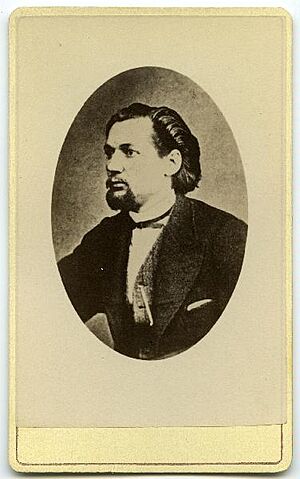Aleksander Kunileid facts for kids
Aleksander Kunileid (born Aleksander Saebelmann; 22 November 1845 – 27 July 1875) was an important Estonian composer. He is known as one of the people who helped create Estonian choral music. Choral music is music written for a group of singers, like a choir.
Kunileid's Life and Music
Aleksander Kunileid was born in 1845 in a place called Audru, Estonia. His father was a teacher. Aleksander and his brother, Friedrich August Saebelmann, showed a talent for music from a young age. Their father taught them to play the organ and the piano.
When he was 16, Kunileid went to a special school for teachers in Valka. There, he studied music with a famous choir leader named Jānis Cimze.
Kunileid finished his studies in 1865. He then worked as a teacher in the village of Paistu for three years. He often played the organ in the local church. During this time, he met important people from the Estonian national awakening. This was a time when Estonians worked to build their own culture and identity. Among these friends were Carl Robert Jakobson, Johann Voldemar Jannsen, and Jannsen's daughter, Lydia Koidula.
Kunileid changed his last name from "Saebelmann" to "Kunileid." He did this because "Saebelmann" sounded too German. His new name came from a saying by Jakobson: Otsi, kuni leiad, which means "Seek, until you find." In 1868, Kunileid became an assistant teacher at the Vidzeme seminary.
Kunileid played a big part in the very first Estonian Song Festival in 1869. This was a huge event where many choirs sang together. Kunileid helped organize the festival with Jannsen. He was also the head judge for the choir performances.
During this time, Kunileid wrote many songs for choirs. Some of his most famous songs include Mu isamaa on minu arm, Sind surmani, and Mu isamaa nad olid matnud. These songs are still very important in Estonia today. Jakobson put Kunileid's songs in his famous collection of Estonian music called Wanemuine Kandle Healed.
In 1871, Kunileid moved to Saint Petersburg with his brother Friedrich. Life was hard for them at first. Kunileid taught at an Estonian school in Gatchina, near Saint Petersburg. Later, he taught at a teacher's school in Kolpino.
In 1873, Kunileid became very sick. He moved to Poltava to teach and play the organ, hoping the warmer weather would help him. Sadly, he passed away there in the summer of 1875. He was buried in Poltava's cemetery.
Kunileid is also a small character in a book by Jaan Kross called Professor Martens' Departure.
Famous Songs by Kunileid
Here are some of the songs Aleksander Kunileid composed:
- "Arg kosilane" (Words by Friedrich Reinhold Kreutzwald)
- "Kaste ja pisarad" (Words by Carl Robert Jakobson)
- "Meil aiaäärne tänavas" (Words by Lydia Koidula)
- "Miks sa nutad, lilleke?" (Words by Lydia Koidula)
- "Mu mõttes on üks ainuke" (Traditional words)
- "Põua aastal 1868" (Words by Carl Robert Jakobson)
- "Süda tuksub" (Traditional words)
- "Ema ja laps" (Words by Carl Robert Jakobson)
- "Mu isamaa on minu arm" (Words by Lydia Koidula)
- "Mu isamaa, nad olid matnud" (Words by Lydia Koidula)
- "Sind surmani" (Words by Lydia Koidula)
- "Veel pole kadunud kõik" (Words by Carl Robert Jakobson)
- "Õitse ja haljenda, eestlaste maa" (Words by Lydia Koidula)
 | Charles R. Drew |
 | Benjamin Banneker |
 | Jane C. Wright |
 | Roger Arliner Young |


